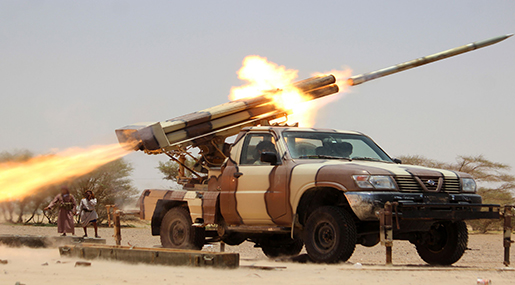
Yemeni Counterstrikes Kill Two Saudis, Targets Military Bases
Local Editor
The Yemeni army, backed by popular committees, launched retaliatory missile attacks on military bases in Saudi Arabia’s southwestern border city of Najran.
In the context, the Yemeni al-Masirah news channel reported on Wednesday that Yemeni forces targeted the Rajlah, Qana, and al-Hayz bases in Najran.
The report further added that the Yemeni army also hit a military base in the southwestern Saudi border region of Jizan with a "Qaher1" ballistic missile in retaliation for Riyadh’s incessant strikes against the country. However, no reports on the possible casualties and damage were immediately available.
In a separate development, dozens of al-Qaeda militants were killed in clashes with Yemeni troops in the Dhi Na’im district of the central province of Bayda.
In parallel, Saudi bomber aircraft pounded a military base in Yemen’s central province of Ma’rib and another base in the port city of Mocha. Saudi warplanes also bombarded various areas in the Yemeni capital, Sana’a, as well as the provinces of Hajjah and Omran.
Furthermore, Saudi website Ajel reported that Corp. Mohammed Bouhi Mohammed Khabrani was killed in the al-Harath district in the south of the Jizan region in southwestern Saudi Arabia on Wednesday during border clashes.
Saudi news website Akhbaar24, meanwhile, reported the death of Salim bin Faraj Allowabesi, another Saudi military personnel member, during a separate counterattack hitting the kingdom’s southern borders on Wednesday.
Back on Tuesday, Saudi airstrikes on Omran Province claimed the lives of seven Yemeni civilians, while a number of others were injured.
Relatively, Yemen has been under Saudi military strikes on a daily basis since late March.
Bahrain, Qatar, the United Arab Emirates, Morocco, and Colombia have dispatched army forces in support of the Saudi military offensive.
In all, more than 7,500 people were killed and over 14,000 others injured since the beginning of the strikes. The Saudi war had also taken a heavy toll on the impoverished country’s facilities and infrastructure.
